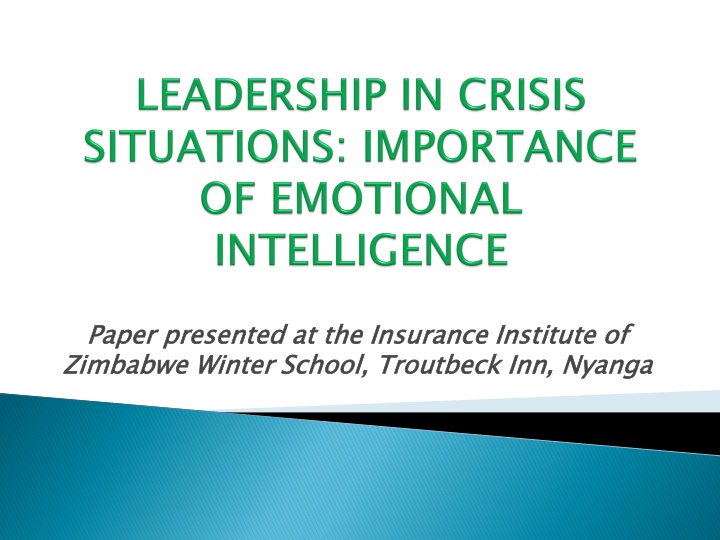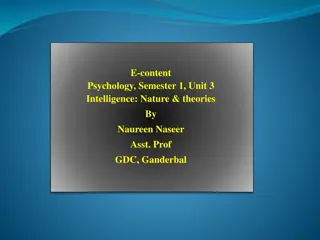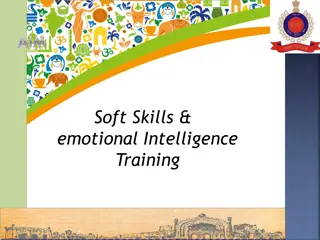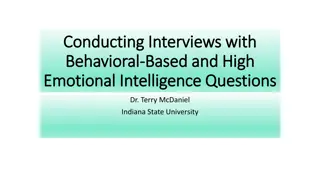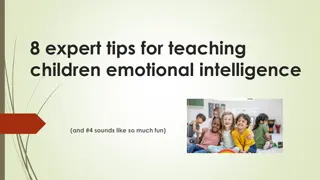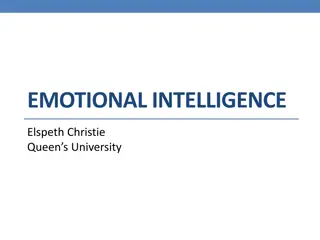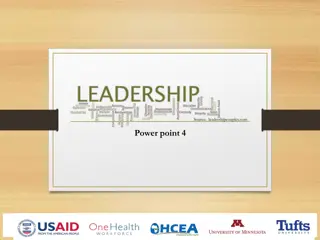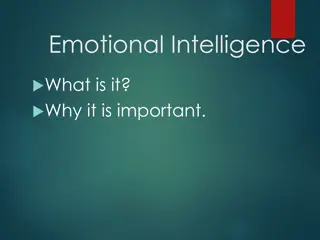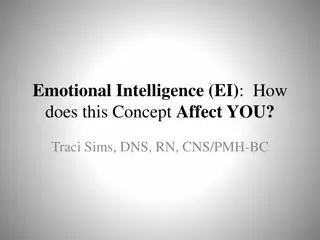Leadership and Emotional Intelligence in Crisis Management
Leadership, defined as the capacity to rally individuals towards a common purpose, is explored in the context of crisis management. Effective leadership is portrayed as a skill to influence and motivate others towards shared goals. Additionally, emotional intelligence is highlighted as a crucial aspect in handling crises, involving the ability to understand and regulate emotions in oneself and others. The discussion delves into the importance of vision, values, and relationships for effective leadership, emphasizing the necessity to manage crises with authority and social intelligence.
Download Presentation

Please find below an Image/Link to download the presentation.
The content on the website is provided AS IS for your information and personal use only. It may not be sold, licensed, or shared on other websites without obtaining consent from the author.If you encounter any issues during the download, it is possible that the publisher has removed the file from their server.
You are allowed to download the files provided on this website for personal or commercial use, subject to the condition that they are used lawfully. All files are the property of their respective owners.
The content on the website is provided AS IS for your information and personal use only. It may not be sold, licensed, or shared on other websites without obtaining consent from the author.
E N D
Presentation Transcript
Paper presented at the Insurance Institute of Zimbabwe Paper presented at the Insurance Institute of Zimbabwe Winter School Winter School, Troutbeck Inn, Nyanga , Troutbeck Inn, Nyanga
1.1 Leadership 1.1 Leadership Leadership is the capacity and will to rally men and women to a common purpose and the character which inspires confidence- Bernard Montgomery. .. The ability to influence, motivate and enable one s team to contribute to the effectiveness and success of an organisation for its members (Anand and Udayasariyan) Or . The skill of influencing people to work enthusiastically towards goals identified as being for the common good Hunter.
Leadership is not necessarily about power, instead it is about authority. Power is the ability to force or coerce someone to do one s will, even if they choose not to. Authority is defined as the skill of getting people to willingly do your will because of your personal influence . Leadership is therefore viewed more as a skill used to influence followers in an organisation to work enthusiastically towards goals specifically identified for the common good while building relationships. One can look at Biblical examples of leadership e.g.. Jesus Christ, Moses and Joshua etc. A leader must have a vision which he influences others/followers to subscribe to. (Where there is no vision people perish). A leader must have values, beliefs, correct attitude and build relationships.
The Opportunity . Chinese define a crisis with two words Danger or Crisis disaster, crossroads, crux, climax, culmination, point of no return, turning point. is also defined as calamity, cataclysm, emergency, A crisis normally arises unexpectedly and usually is unforeseen. While a crisis is a risk it is normally the type of an unforeseen risk. According to Murphy's Law, Anything that can go wrong will go wrong. A crisis that is not correctly managed can escalate or deteriorate to a disaster, catastrophe.
It is a form of social intelligence that involves the ability to monitor ones own and others feelings and emotions, to discriminate among them and to use this information to guide one s own thinking and actions . It is therefore, used to describe qualities like understanding one s own feelings, empathy for the feelings of others and the individual ability to regulate his/her or other people s emotions in a way that determines behaviour and decision making. Emotional intelligence refers to a person s ability to be aware of and manage one s own emotions the emotions and emotive responses of others in various formal and informal communication situations. and to successfully manage In simple terms it is how one conducts himself/herself in an emotionally charged situation.
It is arguable whether leaders are born or made. Modern approach is that leaders can be made can be developed. Developing leaders means equipping them with key leadership competencies. 4 4. .1 1 Key Key leadership leadership Competencies Competencies 4 4. .1 1. .1 1 Commitment Commitment People do not follow uncommitted leaders. Commitment can be seen in a full range of matters such as; Personal sacrifice Putting your best effort Servant leadership
4.1.2 Charisma 4.1.2 Charisma It is the ability by a leader to draw people to him/her. Be more concerned about making others feel good about themselves than you are making them feel good about you. 4.1.3 Initiative 4.1.3 Initiative Be proactive. Begin with the end in mind (vision). Put first things first. (Priority) or (Urgent and Important) 4.1.4 Character 4.1.4 Character This is moral uprightness. Ethical. Leading by example. Do as l do and not as l say. (Action speaks louder than words) Talent is a gift, but character is by choice.
4.1.5 Communication 4.1.5 Communication Seek first to understand before seeking to be understood Do not speak above peoples heads Share ideas and knowledge so as to invoke a sense of urgency and enthusiasm in others If you can t get your message across you can t inspire or motivate others. (Lawyers take something simple and make it complicated. Communicators take something complicated and make it simple.) Develop ability to negotiate and achieve win/win situations. 4.1.6 Competence 4.1.6 Competence Sharpen the saw (acquire necessary skills) Demonstrate skill or knowledge Say it, plan it, and execute it as expected using your knowhow Display excellence and deft of hand (Good sailors emerge or are seen when there is a storm in the sea.)
4.1.7 Focus 4.1.7 Focus If you chase 2 rabbits or birds at the same time, both will escape. Pursue a clear and definable vision Focus more on what you do well and delegate to others what you are weak at. Divided focus or attention works against the leader. 4.1.8 Generosity 4.1.8 Generosity A candle loses nothing by lighting another. Be honored more for what you give than what you receive. There is more satisfaction in giving in ernest compared to receiving. Share in times of need.
4.1.9 Courage 4.1.9 Courage Courage is not the absence of fear but the ability to conquer it. Courage is fear that has said its prayers. Courage is a virtue. Courageous people are held in high esteem. 4.1.10 Discernment 4.1.10 Discernment Do not believe everything you hear. Be able to pick the grain from the chaff. When you are in a hole, stop digging. Be analytical and do not take things at face value do not judge a book by its cover. 4.1.11 Emotional Intelligence EI or EQ 4.1.11 Emotional Intelligence EI or EQ
The above competencies are more critical in times of crisis than in normal situations. During crises, emotions are likely to rise because of the feelings, perceptions and experiences that people have in a crisis. Crisis puts leaders and their followers under pressure. Crisis creates panic particularly in followers. 5.1 Examples of crises that we have learnt or experienced 5.1 Examples of crises that we have learnt or experienced The David/Goliath situation. The Battle of Great Britain. The Zimbabwean War for Independence. The currency crisis of 2007/2008. The cash crisis now being experienced in Zimbabwe. Drought and/ or floods. A fault in an Aircraft while flying. Cholera epidemic / Ebola epidemic.
5.2 In a crisis leaders need the following: 5.2 In a crisis leaders need the following: Quickly get a grasp of what is happening. Gather logistical, skills or talent and quickly devise an action plan. resources needed for reaction e.g. financial, They need to conquer fear and not panic- signs of fear, indecision, paralysis or cowardice can quickly permeate to followers and cause havoc. The way a leader behaves in a crisis is hugely influential and therefore critical. Initial shock and surprise must quickly be replaced by quick thinking.
Synergise and create strong teams Silence in a crisis is not golden It can be very destructive. Leaders need to communicate quickly their thoughts on the nature of the crisis. Take initial mitigating measures and short term tactics and strategies to tackle the crisis while assessing your options and strategies. Never lose sight of the long term vision although you can take a step back to strategise and plan or refuel. Be innovative and think outside the box. Create new ways and methods of doing things. Do not hang around people that you have no benefit from. Eagles fly with eagles. A leader sees an opportunity in a crisis and not danger. Find out what opportunities a crisis presents and take advantage of the opportunities and mitigate the danger.
Reduce the level of damage likely to be caused by lack of readiness for a crisis. (Principle of mitigation of damages in law). Use your experience if it is applicable. If we do not learn from history we become history . Do succumb to procrastination. not procrastinate during a crisis otherwise you Have the right attitude and do not stop sharpening the axe. Be involved and lead from the front when in a crisis. Utilise your emotional intelligence skills in order to make correct decisions.
5.3 Emotional Intelligence Approaches to Crises (Conclusion) 5.3 Emotional Intelligence Approaches to Crises (Conclusion) Asses the morale of your team and ensure it is at the right level or raise it to the desired level. (High morale is a force multiplier.) Show your character as leader -love, empathy, considerate, instill pride and discipline. Be confident and exhibit belief in the task at hand and ultimately the vision you stand for. Where you can t beat the enemy or adversary, competion seek to negotiate with him/her or to partner him/her (where you can t beat them join them).
5.3.1 Put Contingency Plans as follows: 5.3.1 Put Contingency Plans as follows: Potential disaster scenarios. Objective / aim (immediate). Outline the plan. Allocate tasks/ responsibilities. Top level support for decision makers. Funding (resources). Crisis command centre location and organisation. Communicate with staff and public where necessary. NB: Ensure as leader you have the necessary back up i.e. succession plan, so that in your absence the organisation continues to move forward. NB: Ensure as leader you have the necessary back up i.e. succession plan, so that in your absence the organisation continues to move forward.
5.3.2 Key Messages to be communicated 5.3.2 Key Messages to be communicated Show that you care and apologise if at fault. Demonstrate that you have the situation under control. Take effective and decisive action when sure about way forward. Be honest and deal with mistakes openly and fairly. Demonstrate you are doing your best. Show you are working with the appropriate authorities and stakeholders to normalise the situation especially if it relates to safety, security or livelihoods.
QUOTES: QUOTES: Winners win for themselves. Leaders make others win . Winners win for themselves. Leaders make others win . Leadership is a process, not a position. Leadership is a process, not a position. Leaders become great, not because of their power, but because of the ability to empower others. Leaders become great, not because of their power, but because of the ability to empower others. J. C. Maxwell J. C. Maxwell
THE THE END END
